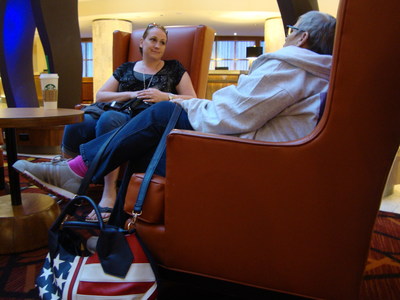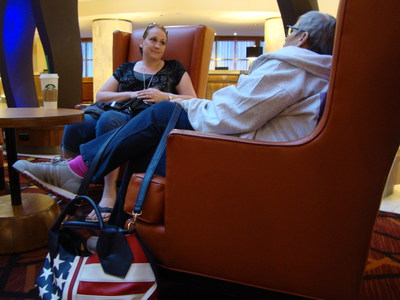Retreat Is A Lifeline For Family Caregivers Of Injured Veterans
BETHESDA, Md., Jan. 28, 2016 /PRNewswire-USNewswire/ -- When Heather Lehman got word she'd been selected to attend an all-expense-paid, three-day retreat for the caregivers of wounded, ill, and injured veterans, she went into panic mode. Who would care for the children? Who would care for her husband, Corey? After surviving multiple roadside bombs and accidents during two tours in Iraq, he is now a severely injured veteran. But something told her she needed this, and her next thought was, "I can't wait!"

So, leaving her mother-in-law in charge, Heather got on a plane in Florida and flew to San Antonio, Tex., for a Yellow Ribbon Fund (YRF) Caregiver Retreat. YRF hosts retreats in various locations several times a year, thanks to a grant from Wounded Warrior Project® (WWP).
Since 2003, WWP has evolved its 20 veteran programs and services to meet the growing needs of the constituency it serves, free of charge. Currently, WWP provides support to more than 83,000 injured service members and over 15,000 caregivers and family support members. Through a high-touch and interactive approach, the WWP vision is to foster the most successful, well-adjusted generation of wounded service members in the nation's history.
A typical day for caregivers of severely injured veterans includes assisting with tasks like getting dressed and fed, administering medications, transporting their veteran to appointments, dealing with doctors and paperwork, plus juggling household chores, often while caring for children. Nights may be interrupted by their veteran's nightmares and other needs. Simple pleasures like eating out may not be possible due to the veteran's physical or psychological injuries. This may go on for months or years; for some it will last a lifetime.
"So many are isolated and alone," explained YRF Family Caregiver Program director Jessica Allen, a caregiver herself. "Our retreats connect caregivers to each other, so they have a battle buddy going forward. They learn they have to take care of themselves so they can take care of their veteran."
In San Antonio, Heather looked at the retreat schedule and saw only restaurant outings, a walk to the nearby Alamo, and a relaxed riverboat tour. The rest of the time was reserved for napping, reading, or whatever she felt like doing, alone or with others. This was her chance to re-energize.
"My main goal for this retreat was sleep," Heather said. She got that and much more. At dinner the first night, while enjoying the rare luxury of being waited on in a restaurant, she found herself comparing notes with Jessica and nine other women who were caring for an injured military loved one.
The next morning during breakfast, the conversation ranged from potty-training toddlers to hyperbaric treatment for brain injuries. The hotel restaurant manager stopped by their table. "Everybody sleep well?" he asked.
The caregivers chorused, "Yes!!!"
"I had the bed to myself," one wife added dreamily. "No night terrors or night sweats." Most of their veterans are dealing with a diagnosis of a traumatic brain injury or severe post-traumatic stress disorder, or both.
"There's no book on how to deal with a brain injury," said one caregiver.
The woman beside her agreed, "Everyone's triggers are different."
"You're always on eggshells," said another, and heads nodded.
Heather said, "It's about finding the glimpses of who they were before. People who didn't know him from before don't understand that." That led to funny, poignant stories about how they met their husbands. They laughed and sipped their coffee.
At the Alamo, Heather let the history of the place take her outside of herself for a while. Another wife stood off to the side, her cell phone at her ear. Another sat texting under a tree. Both were problem-solving for their husbands, long distance. Then they rejoined their fellow caregivers, who listened and understood.
Since returning home, they have stayed in touch via text and a private Facebook page that YRF set up for them. "I developed bonds with women I didn't expect to bond with," Heather said. "We're all walking the same path."
About the Yellow Ribbon Fund
Since 2005, Bethesda, Md.-based Yellow Ribbon Fund has filled gaps in services for injured service members and their families, from hospital to hometown. Last year, 85 cents of every dollar spent went to services and programs. During hospital recovery, YRF offers free rental cars, taxi rides, hotel stays, and apartments; support for family caregivers; and social events, outings, and career and education mentoring. After they return home, YRF's Wellness Program, nationwide network of volunteers, and TUF Team of veteran athletes continue to provide practical support. More information at www.yellowribbonfund.org.
About Wounded Warrior Project
The mission of Wounded Warrior Project® (WWP) is to honor and empower Wounded Warriors. WWP's purpose is to raise awareness and to enlist the public's aid for the needs of injured service members, to help injured servicemen and women aid and assist each other, and to provide unique, direct programs and services to meet their needs. WWP is a national, nonpartisan organization headquartered in Jacksonville, Florida. To get involved and learn more, visit woundedwarriorproject.org.
SOURCE Yellow Ribbon Fund
